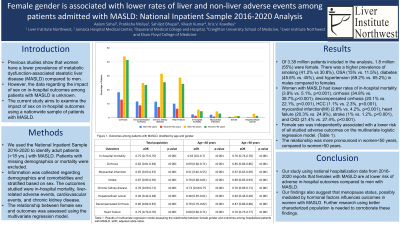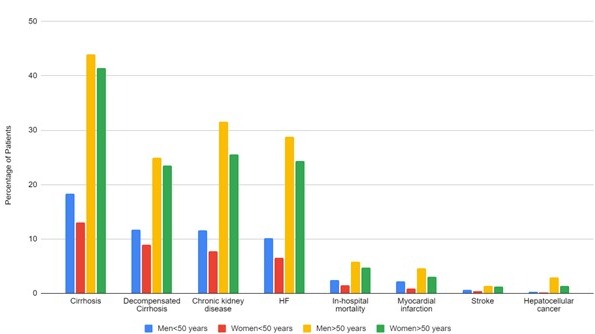Tuesday Poster Session
Category: Liver
P4688 - Female Gender Is Associated With Lower Rates of Liver and Non-Liver Adverse Events Among Patients Admitted With MASLD: National Inpatient Sample 2016-2020 Analysis
Tuesday, October 29, 2024
10:30 AM - 4:00 PM ET
Location: Exhibit Hall E

Has Audio

Aalam Sohal, MD
Creighton University School of Medicine
Seattle, WA
Presenting Author(s)
Aalam Sohal, MD1, Pratiksha Moliya, MD2, Sahiljot Bhupal, MBBS3, Vikash Kumar, MD4, Kris V.. Kowdley, MD, FACG5
1Creighton University School of Medicine, Seattle, WA; 2Jamaica Hospital Medical Center, New York, NY; 3Dayanand Medical College and Hospital, Chicago, IL; 4Creighton University School of Medicine, Brooklyn, NY; 5Liver Institute Northwest, Seattle, WA
Introduction: Previous studies show that women have a lower prevalence of metabolic-dysfunction-associated steatotic liver disease (MASLD) compared to men. However, the data regarding the impact of sex on in-hospital outcomes among patients with MASLD is unknown. The current study aims to examine the impact of sex on in-hospital outcomes using a nationwide sample of patients with MASLD.
Methods: We used the National Inpatient Sample 2016-2020 to identify adult patients ( >18 yrs.) with MASLD. Patients with missing demographics or mortality were excluded. Information was collected regarding demographics and comorbidities and stratified based on sex. The outcomes studied were in-hospital mortality, liver-related adverse events, cardiovascular events, and chronic kidney disease. The relationship between female sex and outcomes was assessed using the multivariate regression model.
Results: Of 3.38 million patients included in the analysis, 1.8 million (55%) were female. There was a higher prevalence of smoking (41.2% vs 30.8%), OSA (15% vs. 11.5%), diabetes (45.6% vs. 45%), and hypertension (69.2% vs. 65.2%) in males compared to females. Women with MASLD had lower rates of in-hospital mortality (3.9% vs. 5.1%, p< 0.001), cirrhosis (34.8% vs. 38.7%,p< 0.001), decompensated cirrhosis (20.1% vs. 22.1%, p< 0.001), HCC (1.1% vs. 2.3%, p< 0.001), myocardial infarction(MI) (2.6% vs. 4.2%, p< 0.001), heart failure (20.3% vs. 24.9%), stroke (1% vs. 1.2%, p< 0.001), and CKD (21.4% vs. 27.4%, p< 0.001). Female sex was independently associated with lower risk of all studied adverse outcomes on multivariate logistic regression model. (Table 1). The relationship was more pronounced in women< 50 years, compared to women >50 years.
Discussion: Our study using national hospitalization data from 2016-2020 reports that females with MASLD are at lower risk of adverse in-hospital outcomes compared to men with MASLD.Our findings also suggest that menopause status, possibly mediated by hormonal factors influences outcomes in women with MASLD. Further research using better characterized population is needed to corroborate these findings

Note: The table for this abstract can be viewed in the ePoster Gallery section of the ACG 2024 ePoster Site or in The American Journal of Gastroenterology's abstract supplement issue, both of which will be available starting October 27, 2024.
Disclosures:
Aalam Sohal, MD1, Pratiksha Moliya, MD2, Sahiljot Bhupal, MBBS3, Vikash Kumar, MD4, Kris V.. Kowdley, MD, FACG5. P4688 - Female Gender Is Associated With Lower Rates of Liver and Non-Liver Adverse Events Among Patients Admitted With MASLD: National Inpatient Sample 2016-2020 Analysis, ACG 2024 Annual Scientific Meeting Abstracts. Philadelphia, PA: American College of Gastroenterology.
1Creighton University School of Medicine, Seattle, WA; 2Jamaica Hospital Medical Center, New York, NY; 3Dayanand Medical College and Hospital, Chicago, IL; 4Creighton University School of Medicine, Brooklyn, NY; 5Liver Institute Northwest, Seattle, WA
Introduction: Previous studies show that women have a lower prevalence of metabolic-dysfunction-associated steatotic liver disease (MASLD) compared to men. However, the data regarding the impact of sex on in-hospital outcomes among patients with MASLD is unknown. The current study aims to examine the impact of sex on in-hospital outcomes using a nationwide sample of patients with MASLD.
Methods: We used the National Inpatient Sample 2016-2020 to identify adult patients ( >18 yrs.) with MASLD. Patients with missing demographics or mortality were excluded. Information was collected regarding demographics and comorbidities and stratified based on sex. The outcomes studied were in-hospital mortality, liver-related adverse events, cardiovascular events, and chronic kidney disease. The relationship between female sex and outcomes was assessed using the multivariate regression model.
Results: Of 3.38 million patients included in the analysis, 1.8 million (55%) were female. There was a higher prevalence of smoking (41.2% vs 30.8%), OSA (15% vs. 11.5%), diabetes (45.6% vs. 45%), and hypertension (69.2% vs. 65.2%) in males compared to females. Women with MASLD had lower rates of in-hospital mortality (3.9% vs. 5.1%, p< 0.001), cirrhosis (34.8% vs. 38.7%,p< 0.001), decompensated cirrhosis (20.1% vs. 22.1%, p< 0.001), HCC (1.1% vs. 2.3%, p< 0.001), myocardial infarction(MI) (2.6% vs. 4.2%, p< 0.001), heart failure (20.3% vs. 24.9%), stroke (1% vs. 1.2%, p< 0.001), and CKD (21.4% vs. 27.4%, p< 0.001). Female sex was independently associated with lower risk of all studied adverse outcomes on multivariate logistic regression model. (Table 1). The relationship was more pronounced in women< 50 years, compared to women >50 years.
Discussion: Our study using national hospitalization data from 2016-2020 reports that females with MASLD are at lower risk of adverse in-hospital outcomes compared to men with MASLD.Our findings also suggest that menopause status, possibly mediated by hormonal factors influences outcomes in women with MASLD. Further research using better characterized population is needed to corroborate these findings

Figure: Outcomes among patients with MASLD, stratified by age and gender
Note: The table for this abstract can be viewed in the ePoster Gallery section of the ACG 2024 ePoster Site or in The American Journal of Gastroenterology's abstract supplement issue, both of which will be available starting October 27, 2024.
Disclosures:
Aalam Sohal indicated no relevant financial relationships.
Pratiksha Moliya indicated no relevant financial relationships.
Sahiljot Bhupal indicated no relevant financial relationships.
Vikash Kumar indicated no relevant financial relationships.
Kris Kowdley: 89bio – Consultant, Grant/Research Support. AbbVie – Consultant, Grant/Research Support. Boston Pharmaceuticals – Consultant, Grant/Research Support. CymaBay, a Gilead Sciences Company – Consultant, Grant/Research Support. Enanta – Consultant, Grant/Research Support. Genfit – Consultant, Grant/Research Support. Gilead Sciences, Inc. – Consultant, Grant/Research Support. Hanmi – Consultant, Grant/Research Support. HighTide – Consultant, Grant/Research Support. Intercept – Consultant, Grant/Research Support. Ipsen – Consultant, Grant/Research Support. Madrigal – Consultant, Grant/Research Support. NGM – Consultant, Grant/Research Support. Novo Nordisk – Consultant, Grant/Research Support. TERNS – Consultant, Grant/Research Support. Viking – Consultant, Grant/Research Support.
Aalam Sohal, MD1, Pratiksha Moliya, MD2, Sahiljot Bhupal, MBBS3, Vikash Kumar, MD4, Kris V.. Kowdley, MD, FACG5. P4688 - Female Gender Is Associated With Lower Rates of Liver and Non-Liver Adverse Events Among Patients Admitted With MASLD: National Inpatient Sample 2016-2020 Analysis, ACG 2024 Annual Scientific Meeting Abstracts. Philadelphia, PA: American College of Gastroenterology.
